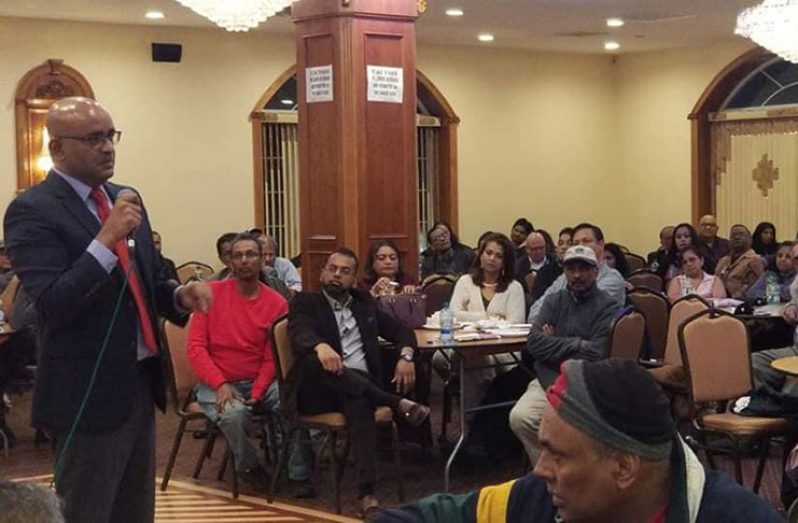LEADER of the Opposition, Bharrat Jagdeo, said the influx of indigenous migrants into Guyana from Venezuela is “atrocious.”
At the time, he was addressing U.S-based Guyanese during a People’s Progressive Party (PPP) Town Hall Meeting at Fairfield Pavilion in Queens, New York on Friday. Jagdeo, while addressing those present on the state of affairs in Guyana, said he visited the North West District and was appalled by the large number of Venezuelans crossing the border into Guyana.
“I’ve been to Mabaruma, I went to Matarkai area, Port Kaituma, and I took a boat and drove up to Mabaruma. I saw what’s happening in those areas with people flowing back from Venezuela, the Warraus coming across and stuff like that, atrocious, atrocious,” the opposition leader told those present.
Some 5,800 Venezuelan migrants have fled to Guyana as a direct result of the growing socioeconomic and political crisis in their country. Overall, more than three million Venezuelans have fled their country since 2015, according to the United Nations.
In Guyana, the government through the Ministry of the Presidency, Department of Citizenship, has been working closely with the United Nations Children’s Fund (UNICEF) and the International Organisation for Migration (IOM) and other international and local organisations to ensure the Venezuelan migrants, whose country is in ruin, have the best possible care with special emphasis placed on health and education.
The National Multi-Sectoral Coordinating Committee headed by Minister of Citizenship, Winston Felix, has been meeting regularly as it monitors the situation and provides necessary assistance.
Recently, the special committee was exploring the option of transforming the Papaya Centre, located in the Barima-Waini Region One, into a facility for migrants but acknowledged that “the greater the inflow of migrants, the more pressed we will be to find space”.
Additionally, the International Organisation for Migration (IOM) is seeking permission from the relevant authorities to renovate an abandoned hostel at Kumaka, Region One, to house migrants, particularly since this is a region where the inflow is greater. A primary school is also being constructed at Eteringbang to accommodate about 60 migrant children.
RESOURCES STRETCHED
It was noted that as a result of the influx of Venezuelans, the regional health and education systems have been spread very thinly to cater to the needs of migrants.
Based on recent reports, there has been an addition of 50 students at Paruima in the Cuyuni-Mazaruni, Region Seven. Taking into account the vast pupil increase in the school system, the United Nations High Commissioner for Refugees (UNHCR) is working with the Ministry of Education to roll out a project that will see Guyanese teachers being trained to teach English as a second language to Spanish-speaking students.
In February, UNICEF and its Guyana office, have received $105M (US$500,000) to fund the provision of water and sanitation hardware, assist the Ministry of Education to build schools’ capacity, and hygiene promotion for Venezuelan migrants. These are geared at combatting issues such as child abuse and child labour among the Venezuelan migrants.
During a recent interview with print journalists, U.S Ambassador, Sarah-Ann Lynch, said her country is opened to having discussion on financial aid for the Venezuelan migrants.
Ambassador Lynch said the U.S has been providing assistance through UNICEF and IOM. The American ambassador said the Guyana Government has not approached the US for financial assistance but it is an area the Embassy is willing to explore, given the increasing number of Venezuelans here. She said in her interactions with officials here, the government has expressed concern.
“What I have offered is that I am happy to have the embassy explore this issue and have additional conversations if they would like assistance,” Ambassador Lynch said, noting that assistance in the area of health may very well be a good starting point, given the current strain on the country’s health sector. It was noted that the majority of Venezuelans coming here have not had decent health care in recent years.
The United States Agency for International Development (USAID) has made available US$1.6 million to the people of Trinidad and Tobago to assist Venezuelans fleeing their homeland.
The US$1.6M provided to the Trinidadian government will focus on strengthening community resilience and capacity to address the recent influx of Venezuelan refugees and migrants to the Twin Island Republic. Funds will not be distributed directly to persons in need, but will be used to assist the people of Trinidad as they assist the people of Venezuela who have migrated in an attempt to escape the hardship facing their homeland.



.jpg)









